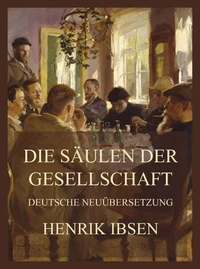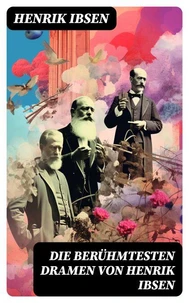An Enemy of the People
Par : ,Formats :
Disponible dans votre compte client Decitre ou Furet du Nord dès validation de votre commande. Le format ePub est :
- Compatible avec une lecture sur My Vivlio (smartphone, tablette, ordinateur)
- Compatible avec une lecture sur liseuses Vivlio
- Pour les liseuses autres que Vivlio, vous devez utiliser le logiciel Adobe Digital Edition. Non compatible avec la lecture sur les liseuses Kindle, Remarkable et Sony
 , qui est-ce ?
, qui est-ce ?Notre partenaire de plateforme de lecture numérique où vous retrouverez l'ensemble de vos ebooks gratuitement
Pour en savoir plus sur nos ebooks, consultez notre aide en ligne ici
- Nombre de pages161
- FormatePub
- ISBN859-65--4736488-7
- EAN8596547364887
- Date de parution15/09/2022
- Protection num.Digital Watermarking
- Taille300 Ko
- Infos supplémentairesepub
- ÉditeurDIGICAT
Résumé
In Henrik Ibsen's "An Enemy of the People, " the narrative revolves around Dr. Thomas Stockmann, a principled physician who discovers that the waters of the town's famous spa are contaminated. Set against the backdrop of 19th-century Norway, Ibsen employs a realist style that masterfully intertwines social critique with dramatic tension. The play challenges the prevailing moral and ethical paradigms of its time, portraying the struggles of individuality against the collective conformity of society, and delving into the complexities of truth, public opinion, and social responsibility.
Ibsen, often referred to as the father of modern drama, crafted this work during a period marked by industrialization and political change, which profoundly influenced his perspectives. His commitment to exposing societal hypocrisies and championing the individual's moral struggles is evident in this play. The personal experiences and ethical dilemmas he faced, along with his critical stance against the bourgeois propriety of his era, fueled his exploration of the tensions between self-advocacy and communal pressure.
"An Enemy of the People" is an essential read for those interested in the intersections of morality, politics, and individualism. Ibsen's profound insights and enduring relevance make this work a compelling examination of the human spirit, inviting readers to contemplate the precarious balance between truth and social welfare. This timeless drama continues to resonate, urging us to remain vigilant against the consequences of collective apathy.
Ibsen, often referred to as the father of modern drama, crafted this work during a period marked by industrialization and political change, which profoundly influenced his perspectives. His commitment to exposing societal hypocrisies and championing the individual's moral struggles is evident in this play. The personal experiences and ethical dilemmas he faced, along with his critical stance against the bourgeois propriety of his era, fueled his exploration of the tensions between self-advocacy and communal pressure.
"An Enemy of the People" is an essential read for those interested in the intersections of morality, politics, and individualism. Ibsen's profound insights and enduring relevance make this work a compelling examination of the human spirit, inviting readers to contemplate the precarious balance between truth and social welfare. This timeless drama continues to resonate, urging us to remain vigilant against the consequences of collective apathy.
In Henrik Ibsen's "An Enemy of the People, " the narrative revolves around Dr. Thomas Stockmann, a principled physician who discovers that the waters of the town's famous spa are contaminated. Set against the backdrop of 19th-century Norway, Ibsen employs a realist style that masterfully intertwines social critique with dramatic tension. The play challenges the prevailing moral and ethical paradigms of its time, portraying the struggles of individuality against the collective conformity of society, and delving into the complexities of truth, public opinion, and social responsibility.
Ibsen, often referred to as the father of modern drama, crafted this work during a period marked by industrialization and political change, which profoundly influenced his perspectives. His commitment to exposing societal hypocrisies and championing the individual's moral struggles is evident in this play. The personal experiences and ethical dilemmas he faced, along with his critical stance against the bourgeois propriety of his era, fueled his exploration of the tensions between self-advocacy and communal pressure.
"An Enemy of the People" is an essential read for those interested in the intersections of morality, politics, and individualism. Ibsen's profound insights and enduring relevance make this work a compelling examination of the human spirit, inviting readers to contemplate the precarious balance between truth and social welfare. This timeless drama continues to resonate, urging us to remain vigilant against the consequences of collective apathy.
Ibsen, often referred to as the father of modern drama, crafted this work during a period marked by industrialization and political change, which profoundly influenced his perspectives. His commitment to exposing societal hypocrisies and championing the individual's moral struggles is evident in this play. The personal experiences and ethical dilemmas he faced, along with his critical stance against the bourgeois propriety of his era, fueled his exploration of the tensions between self-advocacy and communal pressure.
"An Enemy of the People" is an essential read for those interested in the intersections of morality, politics, and individualism. Ibsen's profound insights and enduring relevance make this work a compelling examination of the human spirit, inviting readers to contemplate the precarious balance between truth and social welfare. This timeless drama continues to resonate, urging us to remain vigilant against the consequences of collective apathy.









